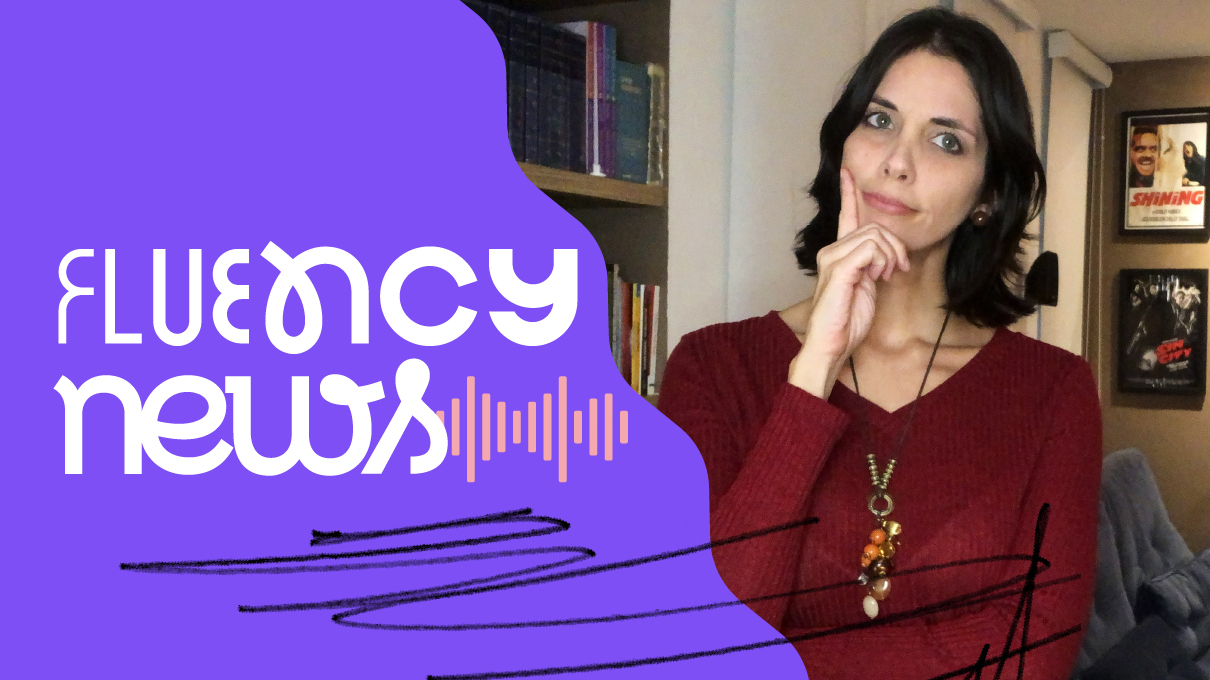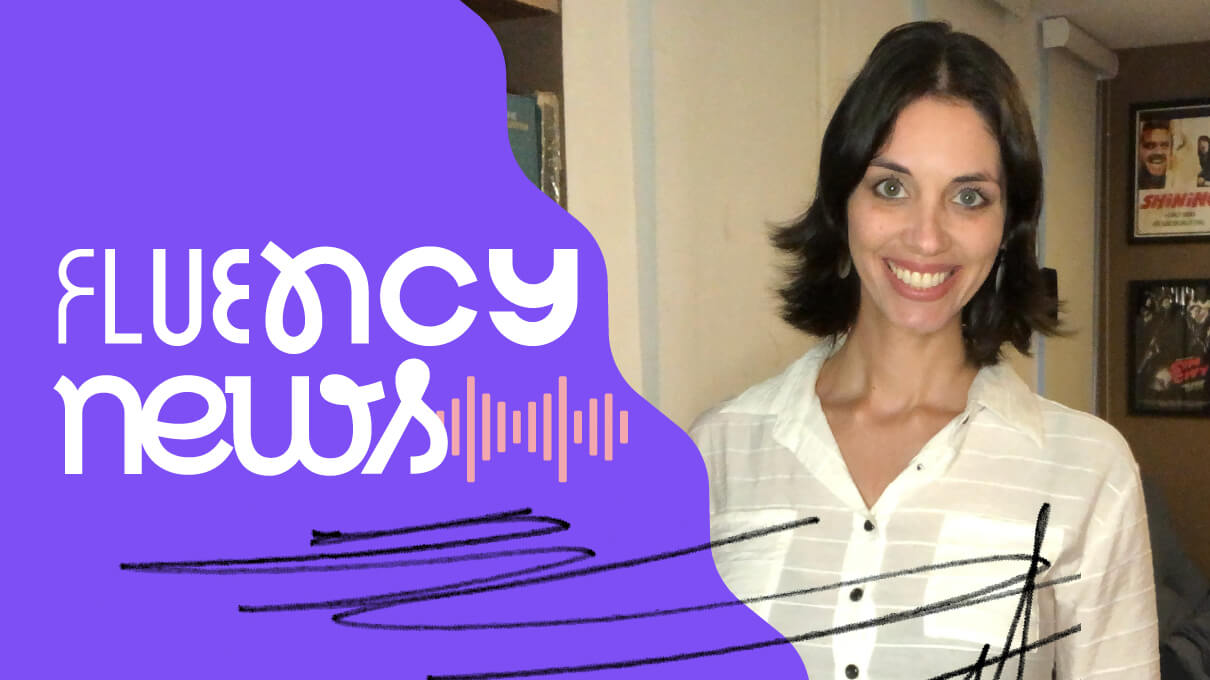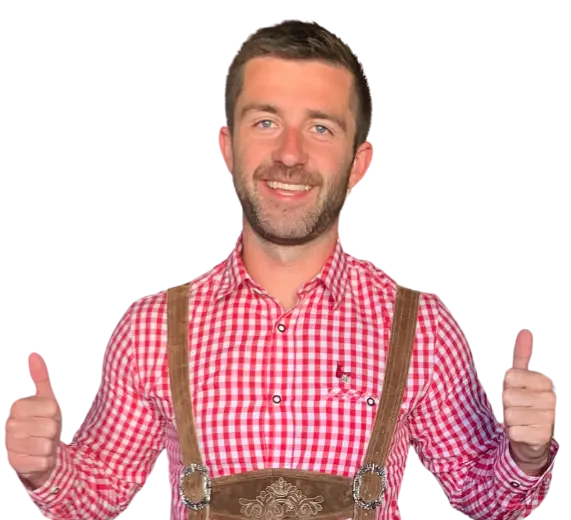Fluency News: Jeffrey Dahmer, Nasa e outras notícias do mundo em inglês!
Hello, everyone!
Sejam bem-vindos e bem-vindas a mais um episódio da nossa série de podcasts, o Fluency News! Aqui você vai treinar a sua escuta e ficar por dentro do que está acontecendo no mundo, sempre com as principais notícias da semana, tudo em inglês! Ao longo do episódio, nós também adicionamos explicações em português das coisas que achamos que precisam de mais atenção, assim você não perde nenhum detalhe!
Neste episódio, você vai saber mais sobre os familiares das vítimas do serial killer Jeffrey Dahmer que criticaramm a nova série da Netflix, sobre o asteróide que a NASA destruiu e também sobre a semana de trabalho de apenas 4 dias que está ganhando popularidade pelo mundo! Come on, don’t miss out!
Temos uma página de dicas de inglês no Instagram, vá conferir! @fluencytvingles
Toda semana, temos um novo episódio do Fluency News, não deixe de escutar! See you!
Transcrição do episódio
Hello everyone, what is up? Scott Lowe here and welcome to Fluency News, para o novo episódio do seu podcast de notícias em inglês, com comentários em português! Tô muito feliz que você está aqui treinando e melhorando seu inglês.
Não esquece que se você estiver me ouvindo do youtube, você pode ativar as legendas para acompanhar as notícias praticando bem o seu listening e sua leitura!
E fica esperto que toda semana tem conteúdo novo para você no nosso portal fluencytv.com e também no YouTube! Já fica inscrito com o sininho para não perder nada.
Now, let’s get to it!
Jeffrey Dahmer foi um dos assassinos em série mais cruéis e desprezíveis da história, mas também um dos mais famosos, com dezenas de livros, documentários e dois filmes sobre sua vida. E agora, a Netflix lançou uma série. Mas como será que isso afeta os familiares das vítimas? Vamo lá pra notícia.
Jeffrey Dahmer, also known as the ‘Milwaukee Cannibal’, was responsible for the murder of 17 men and boys between 1978 and 1991. His sickening crimes involved dismemberment, and cannibalism. The new Netflix show about him quickly made the top 10 list of most watched.
The victims and their family members are a part of the story, many of them being portrayed on the show, but some have come forward saying that they were never contacted about anything, and that they felt that Netflix was making money off of their suffering.
Rita Isbell, sister of victim Errol Lindsey, whose statement was replicated word by word on the show, said it was “retraumatizing”, and spoke about how horrible it feels when she or one of her cousins get calls from friends and even strangers talking about the episodes.
These crimes happened 30 years ago, but new media about the case keeps coming out, including two movies, dozens of books and a bunch of documentaries over the years.
American studies professor Adam Golub told Rolling Stone: true crime popularity and the increasing demand for more means that creators can make a lot of money by continually making stories about the same killers — even if it’s at the expense of the victims’ families.
He also posed the questions “To what point must family members and survivors [be] re-traumatized again and again, through seeing the killer of their loved one portrayed as a character in pop culture? And what crimes and transgressions are we not talking about because we’re so fascinated with this guy from 30 years ago?”
É o dinheiro né, gente? Se vai dar dinheiro, vai ter alguém fazendo. Eu não consigo nem imaginar o que esses familiares passaram e estão passando. Bom, vamos pra nossa dica! Aqui temos um phrasal verb bem específico, na frase
Lettering: They felt that Netflix was making money off of their suffering.
Quando você vê a estrutura “to make money off of”, pode parecer que tem palavra demais aí, então vamos dividir em partes. “To make money” quer dizer “fazer dinheiro/ganhar dinheiro”. Você pode ouvir, por exemplo:
He makes a lot of money as a bartender.
Ele ganha muito dinheiro como barman.
Mas, quando eu quero dar a ideia de um lucro meio suspeito, um lucro abusivo ou injusto, é comum dizer “to make money off of”, vamo ver na frase como fica:
Jack is making money off of his friends.
O Jack tá fazendo dinheiro “nas costas” dos amigos.
Isso quer dizer que o Jack tá fazendo alguma coisa meio estranha e injusta para arrancar dinheiro dos amigos! Dá pra falar sem o “of” também, ficaria assim:
Jack is making money off his friends.
Resumindo então: make money off of, “ganhar dinheiro com”, mas de maneira inescrupulosa, que é o que os familaires das vítimas sentem que a Netflix está fazendo com eles.
Você gostaria que o seu fim de semana tivesse 3 dias? Qual impacto você acha que isso teria na sua vida? Vem ver o que tá rolando.
Changes in the workplace during the coronavirus pandemic, involving remote and hybrid work, have shed a light on questions about many aspects of work. Are we working five days a week just because we have always done it, or is it really the best way?
Even before the pandemic, some schools in the US had started trying the four-day school week, a program that reaches 1600 institutions nowadays. And the results in schools seem promising: teachers are more engaged and happy with their work and students are having longer, more effective classes, but what about the professional field?
Six months into the trial, the 41 participating companies in the Great Britain stated that their productivity has either stayed the same or improved, and that employees have been having more time for themselves, which makes them more energized, less prone to making mistakes and more productive when they are at work.
The same trial is being conducted in other countries like the United States, Canada, Ireland, New Zealand, Australia and Sweden, with results still being processed. And although this has been a topic of discussion since the 1950’s, it might now be closer than ever to the reality of many.
Hmm, será que agora vai? Quem sabe ao longo da próxima década isso chega na gente, né?
Enquanto esse momento não chega, vamos ver um adjetivo bem legal que apareceu nessa notícia! Em inglês, para você dizer que algo ou alguém é propenso ou suscetível a alguma coisa, usamos o termo “prone to”. Na notícia, foi dito que:
Employees are less prone to making mistakes.
Ou seja: funcionários estão menos propensos a cometer erros, eles têm menor tendência a cometer erros. Dá pra falar de tudo, desde saúde até coisinhas do cotidiano:
Lettering: People in my family are prone to diabetes.
Legenda: As pessoas da minha família são propensas ao diabetes.
Lettering: Ginny is prone to catching colds in this weather.
Legenda: A Ginny tem tendência a pegar resfriados nesse clima.
Enquanto a gente tava aqui na terra, dormindo, trabalhando, fazendo nossas coisas, a NASA foi lá e fez o que? Se preparou para salvar a terra? Vamos juntos entender essa história, mas antes aproveita pra mandar o episódio para os seus amigos que gostam de filme de desastre natural a lá “O dia depois de amanhã”! I know they’re out there!
NASA’s first ever earth defense test hit a big milestone today, with a fridge-sized satellite system called DART: Double Asteroid Detection Test, hitting an asteroid the size of a stadium called Dimorphos, 11 million kilometres away from us.
The asteroid was not a threat to Earth but it did offer the perfect target for the mission, and according to the asteroid institute, if that rock really did hit earth, it could destroy a small country.
The plan was not to break or pulverise the asteroid, as depicted in many sci-fi movies, but simply to push it a little – just enough for it to miss a hypothetical Earth. The spacecraft collided with the asteroid at 15.000mph and the moment was livestreamed, showing the asteroid’s surface coming into focus before the spacecraft hit it.
Teams of Nasa and Johns Hopkins University scientists hugged each other as Dart’s successful impact was confirmed. “This is when science, engineering and a great purpose, planetary defense, come together, and, you know, it makes a magical moment like this,” stated a Johns Hopkins team member.
It will take two months to confirm whether or not the impact was successful in changing the asteroid’s trajectory, but the mission can be considered an achievement.
O que é isso, um filme? Nem parece real, mas ainda bem que estamos a um passo de proteger a terra de um impacto gigantes desses que a gente já viu em tantos filmes!
Para a nossa última dica, que é sobre uma palavra que você já conhece, o “just”. Um dos usos do “just” é com sentido de “precisamente” ou “exatamente”. Vimos na notícia que o asteróide precisava se mover exatamente o suficiente para mudar de trajeto, mas no dia a dia, vemos frases como:
Lettering: This hot chocolate is just what I needed.
Legenda: Esse chocolate quente é exatamente o que eu precisava.
Lettering: I know just what to do to help Kelly.
Legenda: Eu sei exatamente o que fazer para ajudar a Kelly.
And this episode was just what you needed to practice English today!
Ok, guys! That’s all for this week’s news! Obrigado por me acompanhar até o fim do episódio, foi bom demais estar com você e espero que tenha gostado. Não esquece de comentar o que achou das notícias! E se você gostou do episódio, não esquece de compartilhar com a galera e se inscrever aqui no canal!
See you next week!
Peace!
Stories
Family members of Jeffrey Dahmer’s victims speak out about new Netflix show
https://www.insider.com/rita-isbell-sister-jeffrey-dahmer-victim-talks-about-netflix-show-2022-9
https://www.cosmopolitan.com/uk/entertainment/a41384671/netflix-jeffrey-dahmer-story-backlash/
https://www.rollingstone.com/culture/culture-news/jeffrey-dahmer-victim-family-member-1234600265/
Four-day work week gaining popularity around the globe
https://www.theguardian.com/education/2022/sep/26/four-day-school-week-teachers-students-parents
https://www.nytimes.com/2022/09/22/business/four-day-work-week-uk.html
https://www.bbc.com/news/business-62966302
NASA destroys asteroid
Playlist








































































































 Curso de Inglês
Curso de Inglês
 Curso de Espanhol
Curso de Espanhol
 Curso de Francês
Curso de Francês
 Curso de Mandarim
Curso de Mandarim
 Curso de Italiano
Curso de Italiano
 Curso de Japonês
Curso de Japonês
 Curso de Alemão
Curso de Alemão
 Curso de Coreano
Curso de Coreano
















 Blog
Blog  Podcast
Podcast  Lives
Lives  Aulas
Aulas  eBooks
eBooks  Minicursos
Minicursos














